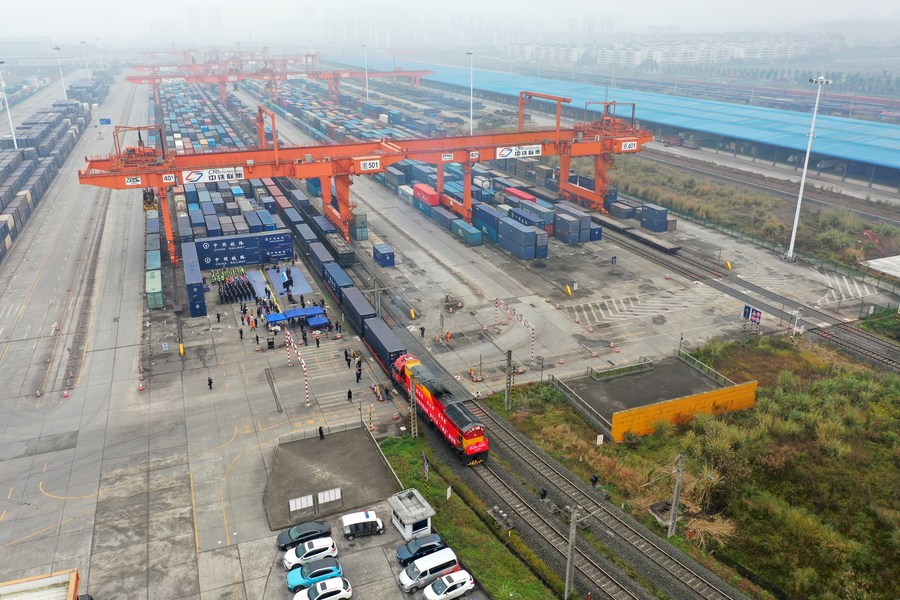China and EU recognize they need each other
- ?By George N. Tzogopoulos
 0 Comment(s)
0 Comment(s) Print
Print E-mail China.org.cn, January 6, 2021
E-mail China.org.cn, January 6, 2021

The new year starts with optimism for China and the European Union. On Dec. 30, the two sides announced that they had concluded in principle the negotiations for a Comprehensive Agreement on Investment (CAI).
The announcement is significant for several reasons. To start with, Beijing and Brussels demonstrated their determination to rely on multilateralism in a period of serious global economic turmoil. While technical details are not yet known, what certainly matters is their joint interest in proceeding together in a changing world characterized by uncertainty.
The September 2020 China-EU virtual summit paved the way for a diplomatic sprint in the last months of the year. This, however, was only the last part of marathon negotiations launched in 2013.
The conclusion of the CAI was the result of 35 rounds of intensive talks requiring mutual compromises and delicate gestures of common will, especially towards the end. The last four rounds of negotiations took place from September until December 2020.
The deal is comprehensive and goes deeper in comparison to previous bilateral investment agreements signed between China and member states of the EU. It encompasses a holistic agenda addressing questions about investments but also touching upon important themes such as sustainable development, labor rights, subsidies and dispute settlement mechanisms.
Both China and the EU appear satisfied with the result. China combines its opening-up and reform policy with granting the possibility to European companies to further access its market. Even before the announcement on the CAI, the Chinese government had already reduced items on the negative list.
At the same time, Chinese companies investing in the EU will be able to benefit by a standardized European framework common in member states.
Meanwhile, the EU achieves what it has demanded for years: additional opportunities in the Chinese market. The website of the European Commission showcases the examples of manufacturing as well as services such as finance, private healthcare and international maritime transport.
Further, Brussels has managed to make its voice heard on industrial subsidies in order to defend the economic interests of European companies vis-à-vis Chinese state-owned enterprises.
The so-called level playing field will be accelerated with the realization of the China-EU CAI. Against this backdrop, President of the European Commission Ursula von der Leyen is confident the agreement will re-balance the European economic relationship with China.
China and the EU need each other. Conclusion of the CAI negotiations shows the two partners were wise to prioritize synergies over disagreements. In COVID-19 times, the word "cooperation" is often employed in theoretical discourse but not always applied in practice. Beijing and Brussels prefer the safe way of responding to challenges together.
While China is unleashing the potential of its domestic market with emphasis on innovation, the EU counts on its New Generation Fund to stabilize economic recovery.
Objectives can be better met when more than two hands work to the same end. Different policies will intersect if there is common will. This is the case, for instance, in regard to the Belt and Road Initiative and the EU-Asia Connectivity Strategy.
China and the EU do not agree on everything. However, they have shown the capacity for making steps in unison via continuing their dialogue. The CAI does not constitute an exception in Sino-European relations. The agreement on geographical indications, the beginning of new high-level conversations on digital issues and climate change, and the emphasis on substantial collaboration during the pandemic were indicative of the relatively good climate in 2020.
Significant progress does not stop with the CAI. Negotiations on setting up the Strategic Agenda for Cooperation 2025 and perhaps the creation of a free trade area will further elevate the partnership. Above all, China and the EU share the common logic of seeing the COVID-19 virus as a common enemy that requires joint actions.
George N. Tzogopoulos is a columnist with China.org.cn. For more information please visit:
http://m.formacion-profesional-a-distancia.com/opinion/GeorgeNTzogopoulos.htm
Opinion articles reflect the views of their authors, not necessarily those of China.org.cn.
If you would like to contribute, please contact us at opinion@china.org.cn.





